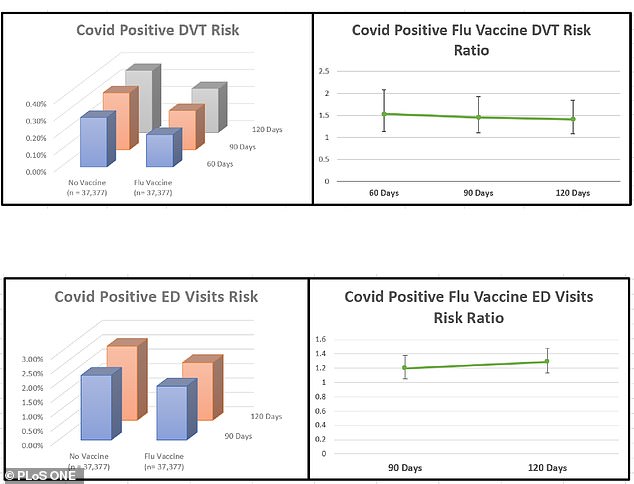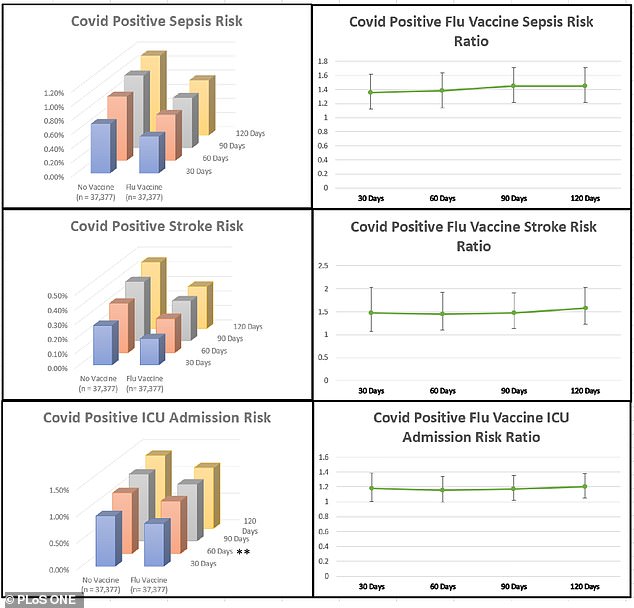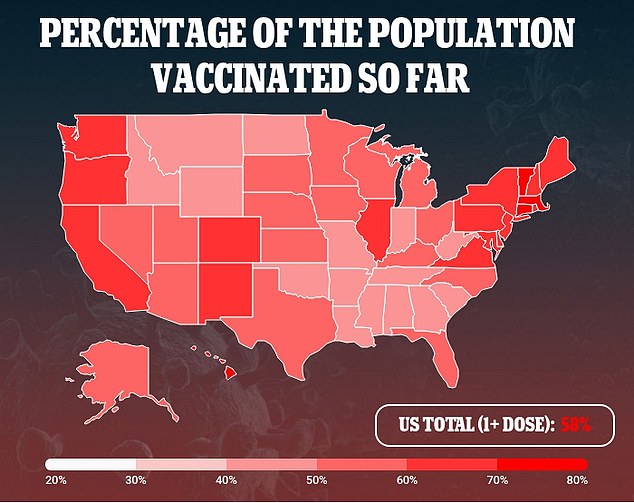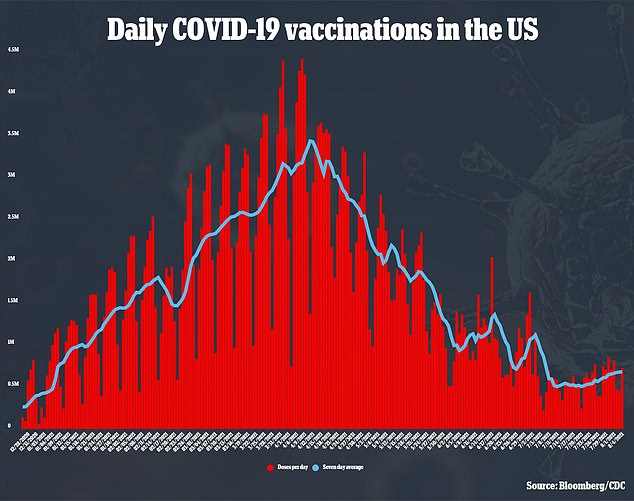Getting an annual flu shot may offer protection against COVID-19 as well, a new study suggests.
Researchers at the University of Miami Miller School of Medicine studied medical records from almost 75,000 Covid patients.
They found patients who had recently gotten inoculated against influenzas had better outcomes, including almost 60 percent less likely to visit the emergency department and more than one-third less likely to develop severe blood clots.
Scientists aren’t yet sure whether the shot itself is protective, or if a person who gets a flu vaccine is likely to be overall healthier than those who skip the shot.
Still, flu vaccination appears to be beneficial – and may be a useful tactic in countries that don’t yet have access to Covid vaccines, the researchers say.

A flu shot provides protection against severe outcomes from COVID-19, according to a new study (file image)

Flu vaccination reduced patients’ risk of visiting the ER and of experiencing deep vein thrombosis (DVT), a severe form of blood clotting, the study found
Because much of the world likely won’t have widespread Covid vaccine access until 2022 or later, scientists are seeking out other ways to protect people against the disease.
One potential tactic may be flu vaccinations.
Several past studies have shown that flu shots may also provide patients with some protection against COVID-19 by boosting the immune system’s natural capacity to fight new infections.
A new study adds more evidence to this trend, in the largest investigation yet into Covid protection from flu shots.
For the study, published Tuesday in PLOS One, researchers used anonymous, electronic health records from almost 75,000 people who were diagnosed with Covid between January 2020 and January 2021.
The records came from 56 different healthcare centers with most based in the U.S., but also including centers in the UK, Italy, Germany, Israel, and Singapore.
In order to compare Covid outcomes between patients who had and hadn’t been vaccinated against the flu, the researchers looked at two groups of 37,000 patients – one group who’d received flu shots and one who had.
The two groups were matched so that patients had similar age ranges, rates of chronic conditions, and other COVID-19 risk factors.
To qualify for the flu vaccine group, patients had to have received the jab between two weeks and six months before their Covid diagnosis.
After six months, flu immunity would begin to wane, the researchers said.

Flu shot patients were 58 percent less likely to have a stroke and 40 percent less likely to develop sepsis, compared to those who hadn’t received that vaccine
The patients who had received a flu shot were less likely to experience severe Covid outcomes than those who didn’t get the shot.
Flu shot patients were 58 percent less likely to visit the emergency department and 20 percent less likely to visit the intensive care unit.
These patients were also 40 percent less likely to develop deep vein thrombosis, a very serious form of blood clots, due to COVID-19.
Plus, the flu shot patients were 58 percent less likely to have a stroke and 45 percent less likely to experience sepsis, a severe response to infection.
The researchers didn’t find a significant difference in Covid death rates between the two patient groups, which aligns with past studies on flu shots.
Scientists are still working to determine exactly how flu shots confer protection against Covid.
But leading theories say that the flu shot may boost the immune system’s ability to respond to new infections.
The University of Miami researchers suggest that flu vaccines support production of natural killer cells, immune system cells that can limit the spread of an infection and cut down on tissue damage.


Studies have shown that patients with severe Covid tend to have lower levels of natural killer cells.
Also, flu vaccines contain a component called MF59 that’s known to assist in immune response.
There may also be a factor outside the vaccines themselves. People who get vaccinated against the flu may overall be healthier than those who don’t, leading them to have a lower risk of severe Covid outcomes.
But regardless of the mechanism, this study demonstrates that flu vaccination could be a way to protect populations that don’t yet have access to Covid vaccines – while protecting people against the flu at the same time.
‘Influenza vaccination may even benefit individuals hesitant to receive a COVID-19 vaccine due to the newness of the technology,’ said Susan Taghioff, researcher at the University of Miami and lead author on the study.
‘Despite this, the influenza vaccine is by no means a replacement for the COVID-19 vaccine and we advocate for everyone to receive their COVID-19 vaccine if able to.’
Taghioff added: ‘Regardless of the degree of protection afforded by the influenza vaccine against adverse outcomes associated with COVID-19, simply being able to conserve global healthcare resources by keeping the number of influenza cases under control is reason enough to champion continued efforts to promote influenza vaccination.’
Source link : https://www.dailymail.co.uk/health/article-9866119/Flu-shots-protect-against-severe-COVID-19-study-finds.html











